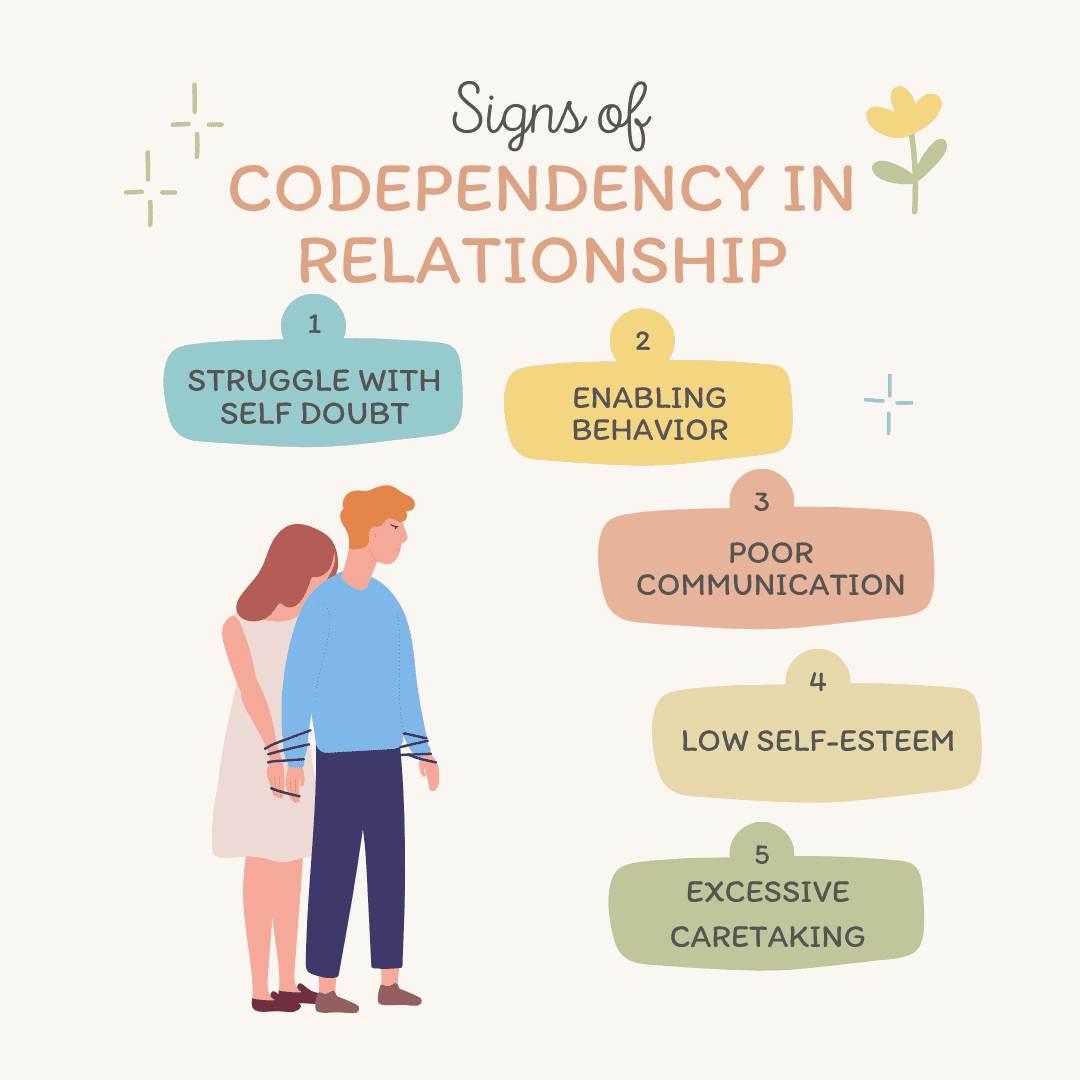Codependent relationships are common but often misunderstood. In these relationships, one person constantly prioritizes the other’s needs over their own. This creates a cycle of dependency and emotional distress.
Understanding codependency is necessary for identifying and addressing these patterns, leading to healthier and more balanced relationships.
A study indicated that women married to men struggling with drug addiction are more likely to experience codependency in their relationships.
What is Codependency in a Relationship?
What is codependency in a relationship? Codependency is a condition when one partner relies too much on the other for emotional support and validation. This often leads to an unbalanced relationship where the codependent person ignores their own needs to take care of their partner.
It can come from a fear of abandonment, low self-esteem, or a strong need to feel needed. Understanding codependency means recognizing these unhealthy patterns and how they affect both partners.
What are the signs of Codependency?
Recognizing codependent behavior is the initial step in addressing and overcoming it. Here are a few typical indicators of codependency:
- Compulsive Need to be Needed: Codependent individuals often derive their self-worth from their ability to care for and support others. This compulsive need can become all-consuming, overshadowing their own needs and desires.
- Low Self-Esteem: Codependents typically struggle with low self-esteem and a lack of confidence. They may seek validation and approval from others to feel worthy or valued.
- Poor Boundaries: Those in codependent relationships often have difficulty setting and maintaining healthy boundaries. They might feel accountable for their partner’s happiness and well-being, which can create an imbalance in the relationship.
- People-Pleasing Behavior: Codependent individuals may go to great lengths to delight others, even at the cost of their well-being. They may fear rejection or conflict, leading them to prioritize their partner’s needs over their own.
- Difficulty in Expressing Emotions: Codependents may find it difficult to express their own emotions and needs, often suppressing them to avoid conflict or rejection.
- Enabling Behavior: In their desire to help and support their partner, codependents may enable unhealthy behaviors, such as addiction or irresponsibility, inadvertently perpetuating the cycle of dependency.

Causes of Codependency
Understanding what is codependency in a relationship also involves exploring its root causes. Codependency can arise from several factors, such as:
-
Childhood Experiences
Many people become codependent because they grew up in dysfunctional families where their emotional needs weren’t met. For example, if a child had to take care of their parents or siblings, they might learn to put others’ needs before their own to get love and approval.
-
Trauma and Abuse
Past experiences of trauma or abuse can contribute to codependent behaviors. These individuals may develop a heightened sense of responsibility for others’ well-being as a coping mechanism. For instance, someone who was mistreated might feel a strong need to take care of others as a way to cope with their pain and gain a sense of control.
-
Societal and Cultural Influences
Societal norms and cultural expectations can reinforce codependent behaviors. For example, in many cultures, women are often expected to prioritize their family’s needs above their own. This can lead to a pattern where a woman neglects her well-being to fulfill societal expectations.
-
Low Self-Esteem
A lack of self-worth and confidence can drive individuals to seek validation and approval from others, leading to codependent behavior patterns. For example, a person with low self-esteem might constantly seek reassurance from their partner to feel valued and worthwhile, which can contribute to codependency.
Examples of Codependency
To further understand what is codependency in a relationship, consider these examples:
- Romantic Relationships: One partner may constantly cancel their plans and interests to take care of the other, even when it’s not necessary. This can lead to feelings of bitterness and exhaustion.
- Parent-Child Relationships: A parent might enable their child’s irresponsible behavior by constantly bailing them out of difficult situations, such as paying their bills or solving their problems, preventing the child from developing independence.
- Friendships: A friend might always prioritize their friend’s needs over their own, offering support and care at the expense of their well-being, leading to an unbalanced and draining relationship.
How to Overcome Codependency?
Breaking free from codependency requires self-awareness, commitment, and effort. Here are some tips to help you overcome codependent behaviors:
- Educate Yourself: Understanding what is codependency in a relationship is crucial. Read books, attend workshops, and seek information to gain a deeper understanding of codependency and its effects.
- Set Healthy Boundaries: Practice establishing and maintaining boundaries. This involves identifying your limits and expressing them clearly to others. Learn to say “no” when necessary and prioritize your own needs.
- Build Self-Esteem: Engage in activities that increase your confidence and self-worth. Celebrate your achievements, practice positive self-talk, and pursue hobbies and interests that bring you joy and fulfillment.
- Seek Professional Help: Consider working with a therapist who specializes in codependency. Therapy can provide valuable insights, strategies, and support in breaking codependent patterns and developing healthier relationships.
- Practice Self-Care: Prioritize your physical, emotional, and mental well-being first. Engage in activities that nurture and rejuvenate you, such as exercise, meditation, and spending time with supportive friends and family.
- Join Support Groups: Connecting with others who are experiencing similar challenges can be very helpful. Support groups offer a safe space to communicate experiences, gain insights, and receive encouragement.
Ways to Help Someone with Codependency
If you recognize codependent behaviors in a loved one, here are some ways you can offer support:
- Educate Yourself: Learn about codependency to better understand what your loved one is going through. This will help you provide informed and empathetic support.
- Encourage Professional Help: Suggest that your loved one seek therapy or counseling. A professional can provide the necessary tools and strategies to address codependent behaviors.
- Promote Healthy Boundaries: Encourage your loved one to set and maintain healthy boundaries in their relationships. Support them in prioritizing their own needs and well-being.
- Offer Emotional Support: Be a compassionate listener and offer emotional support without enabling codependent behaviors. Encourage independence and self-sufficiency.
- Model Healthy Relationships: Demonstrate healthy relationship behaviors in your interactions with others. This can serve as a positive example for your loved one to follow.
FAQs
Q: How can I overcome codependency?
A: Overcoming codependency involves self-awareness, setting healthy boundaries, building self-esteem, seeking professional help, practicing self-care, and joining support groups.
Q: How can I help someone with codependency?
A: You can help by educating yourself, encouraging professional help, promoting healthy boundaries, offering emotional support, and modeling healthy relationship behaviors.
Q: Can codependency occur in non-romantic relationships?
A: Yes, codependency can occur in various types of relationships, including parent-child relationships, friendships, and even workplace relationships.
Q: Is codependency the same as being caring and supportive?
A: No, while caring and supportive behaviors are positive, codependency involves an unhealthy level of sacrifice and neglect of one’s own needs, leading to an imbalanced relationship.
Q: What role does therapy play in overcoming codependency?
A: Therapy provides valuable insights, strategies, and support for understanding and addressing codependent behaviors, helping individuals develop healthier relationship patterns and personal boundaries.
Conclusion
Understanding what is codependency in a relationship is crucial for recognizing and addressing these unhealthy patterns. Codependency involves an imbalance where one person consistently puts the needs of another above their own, leading to emotional distress and an unhealthy dynamic. By identifying the signs, exploring the causes, and implementing strategies to overcome codependency, individuals can foster healthier, more balanced relationships.
Whether you are struggling with codependency or supporting a loved one, taking proactive steps toward change can lead to greater well-being and more fulfilling connections. Remember, overcoming codependency is a journey that requires patience, commitment, and self-compassion. Take the first step towards a healthier life with BHouses today.










